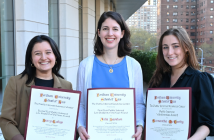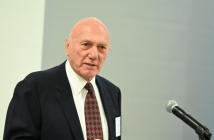When the Fordham Sports Law Forum held its first annual symposium over two decades ago, the concept of eSports was an out-of-bounds play; eSports didn’t yet exist, at least not as a global billion-dollar industry. The forum’s 23rd annual symposium, held on February 22 at the School’s Skadden Conference Center, featured panels on this very topic as well as the legalization of sports betting and a roundtable discussion featuring laws from NBA, NFL, and NHL franchises. With changes in the world of sports coming ever more rapidly, sports lawyers must be ready to think several steps ahead in the playbook.
The symposium began with a morning keynote address from Howie Roseman ’00, executive vice president of football operations for the Philadelphia Eagles. Roseman recounted his path to the front office of an NFL team, particularly directing his speech to the current law students in the audience.
From an early age, Roseman knew he wanted to be a general manager in the NFL. When he was a student at the University of Florida, Roseman even offered to work free of charge for the university’s football team, as a way to get a head start on his career; he was promptly turned down. Similar rejections would come later on from the NFL teams—all 32 of them—that Roseman had repeatedly submitted applications to.
But Roseman persisted, eventually landing an entry-level position with the Eagles. From there, he worked his way up the ranks, learning as he went and gaining more responsibility. Roseman credited his Fordham Law education as a main factor in his success.
“Fordham Law taught me how to think,” Roseman said. Getting a law degree and learning how to think deeply and analytically “meant I wasn’t just a college kid who wanted a job in the NFL. … Now I had something to sell.”
Roseman ended by reminding the students in the audience to persevere in their goals and to aim high. “If you don’t take risks,” he said, “you have no chance to be great.”
Following Roseman’s talk was the day’s first panel, on the legalization of sports betting. Stephen Master, chief revenue officer for SimpleBet, who moderated the panel, noted that as regulations on gambling have been eased in recent years there has been an increased level of audience engagement with sports, citing studies that have demonstrated avid sports bettors watch more games, and tune into games for longer periods of time.
Christian Genetski, chief legal officer of FanDuel Group, one of the most prominent organizations in the sports betting space, provided insight on his organization’s efforts to capitalize on this increased engagement including how FanDuel Group transformed from a company focused on daily fantasy sports to operating a sports book in New Jersey.
While the increased engagement is beneficial for leagues, many issues remain in this burgeoning area of law. “The leagues are in over their head with respect to understanding gambling laws,” said panelist Marc Edelman, adjunct professor at Fordham Law. “It’s not anyone’s fault, it’s because it’s new.”
John Gerba ’06, associate counsel for National Hockey Players’ Association, noted this lack of understanding and absence of clarity impacts players as well. “Is an algorithm that says someone should have scored more points or goals in that game than they actually did enough to justify an investigator requesting access to a player’s text messages to find out if the player threw the game on purpose?” said Gerba. As the laws develop, these issues will be the focus of Gerba and his team.
The symposium’s second panel, moderated by Mark Conrad, associate professor at Fordham’s Gabelli School of Business and director of the Sports Business Program, focused on the world of team counsel. Featuring lawyers for the Brooklyn Nets, Detroit Pistons, New York Jets, and New York Islanders, the panel addressed daily life for in-house lawyers at professional franchises and how to break into the field.
Panelist Rich Haddad, senior vice president for business affairs and general counsel for Palace Sports & Entertainment / Detroit Pistons, recommended to the aspiring sports lawyers in the audience that they start out at a traditional law firm first. “It really gives you the chance to develop as an attorney and learn how to deal with that type of environment,” he said. These skills, he and his co-panelists agreed, will not be wasted in the world of sports law.
Providing behind-the-scenes insight into the life of a team’s lawyer, Kari Cohen, vice president and deputy general counsel for BSE Global / Brooklyn Nets, described how something fans typically take for granted, such as sponsorships in an arena, require a team’s attorney to work intricately on the details of the agreement. Cohen explained that perfecting a defined sponsorship category in an agreement involving exclusivity helps to ensure her sales team can maximize revenue opportunities for the organization.
“We’re fortunate to work in the sports world—but we’re general counsel to multimillion-dollar companies when it comes down to it,” added panelist Zach Klein, deputy general counsel for the New York Islanders. In working for such organizations, team counsel must become experts in unique areas. Hymie Elhai, senior vice president of business affairs and general counsel for the New York Jets, provided an anecdote to illustrate this for the crowd. He had to become knowledgeable about helicopter laws during the development of the Jets’ practice facility.
The final panel of the day focused on the world of eSports, a rapidly developing space in the sports industry. Featuring co-chairs of O’Melveny & Myers’ sports industry group, Chuck Baker and Jared Bartie, as well as Kevin Knocke (ReKT Global) and Pepperdine University’s Alicia Jessop, the panelists explained how this industry is developing and why it is appealing to the younger generation. Of particular interest to the panelists were the efforts of traditional professional sports leagues to become involved in this space and how the organization of eSports leagues differ from that of the NBA or NFL.
Maureen Hanlon, president of Onexim Sports and Entertainment, capped off the event as the afternoon keynote. Hanlon described how her perspective has changed going from outside counsel for more than 25 years (including to Onexim on several of their deals) to now leading the organization and living in a world dictated by the deals she negotiated in her prior role. She also went on to share her thoughts on how team ownership has transformed into more of a business than even just ten years ago, as she explained the traditional structure of a family owning a team for generations has become less common. Hanlon concluded her speech with words of encouragement for women in the audience who may want to break into the industry but are concerned about it being a traditionally male-dominated field, noting that more opportunities are becoming available and that the industry has changed compared to when she first started.
The symposium was presented in conjunction with Weil, Gotshal & Manges and the Sports Lawyers Association.




